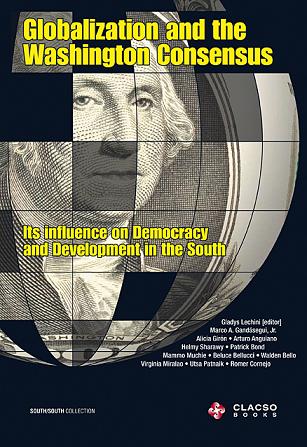|
Globalization and the Washington Consensus : its influence on
democracy and development in the south.
Gladys Lechini (editor)
Marco Gandásegui, Alicia Girón, Arturo Anguiano, Helmy Sharawy, Patrick Bond, Mammo Muchie, Beluce Bellucci, Walden Bello, Virginia Miralao, Utsa Patnaik,
Romer Cornejo

Others indexing terms (descriptors) assigned by the Virtual Library of CLACSO:
Globalization / Washington Consensus / Democracy / Economic and
Social Development / International Financial Institutions / South-South
Cooperation / Poverty / Africa / Asia / Latin America
Otros descriptores asignados por la Biblioteca virtual de CLACSO:
Globalización / Consenso de Washington / Democracia / Desarrollo
Económico y Social / Instituciones Financieras Internacionales /
Cooperación Sur-Sur / Pobreza / África / Asia / América Latina
ISBN: 978-987-1183-91-3
(23 x
16 cm) 224 páginas
(Programa Sur-Sur)
(Buenos Aires: CLACSO, 2008)
From the early 1980s, the policies of structural adjustment were introduced in the South as an all-embracing framework for “reform” to overcome their historical problems of development. But, rather than helping to solve them, the orthodox recipes of stabilization and structural adjustment became major factors in the dynamics of crises and decline experienced in most countries of the South, reinforcing existing difficulties and introducing new ones of their own.
In this adjustment process a key instrumental dual role was played by the International Financial Institutions (IFIs) –on the one hand, an economic role, forcefully promoting and implementing the neoliberal agenda in a whole range of markets and economic institutions; on the other hand, a political role, helping to “discipline and align” restive national governments within the narrow limits established by the Washington Consensus.
Within this context, these financial institutions became critical avenues for the overwhelming predominance of an international hegemonic structure –led by global dominant economic and political forces– into the policy-making and the domestic agenda of supposedly sovereign states, causing new forms of subordination and control. Thus, the abandonment of these orthodox policies has become a crucial matter for the future of democracy and development in the South.
With these challenging topics in mind, scholars from Africa, Asia and Latin America met in Caracas to discuss the general issues concerning the global processes and the role of international financial institutions in shaping the new international structure. They also examined more specific problems related to the impact of the structural adjustment policies on poverty and social exclusion and the difficult task of bringing about the reconciliation of democracy and development in the three regions, dealing with the concrete examples of Mexico, Ethiopia, Mozambique, India, Philippines, China and Taiwan.
|
Indice
Introduction
Gladys Lechini
Global Processes and their effects on Latin America. Polycentric v. perturbed words.
Marco Gandásegui
International Monetary Fund: From the stability
to the instability of the Washington consensus
and the reforms in Latin America
Alicia Girón
Mexico: contradictions and uncertainties of an
incomplete democratic process
Arturo Anguiano
The American led Globalization as the Main
Obstacle to the Development of Democracy in the
Arab World and Africa
Helmy Sharawy
The looting of Africa
Patrick Bond
The Impact of the Washington Consensus on
Democratic Stability: The case of Ethiopia
Mammo Muchie
Everything and nothing. The Challenge of Capital
in Mozambique
Beluce Bellucci
The Global Crisis of Legitimacy of
Liberal Democracy
Walden Bello
Globalization, Democracy, and Development: Some
Asian Patterns and the Philippines’ Experience
Virginia Miralao
Theorizing Poverty and Food Security in the era
of Economic Reforms
Utsa Patnaik
Political participation and challenges of new democracies: remarks on
China and Taiwan.
Romer Cornejo |
